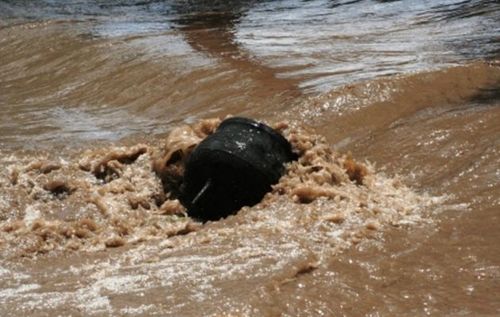Thursday, December 1
It’s pouring down rain with a tropical vengeance at the moment after several days of clear skies and fierce heat.
This rain reminds me that it’s important to remember what climate
change means for the 99% here in Durban and in many parts of the global
South. Last Sunday, the day before the UN climate conference here began,
violent storms caused flooding that killed six people. The photograph
of a woman’s body, from an article in a local newspaper about the impact of the floods,
dramatizes in the most concrete terms what we mean when we talk about
climate change in this part of the world. Her body lies unmourned in the
midst of the swirling waters unleashed by the floods. One hopes that
her body was recovered and properly buried, but it serves as an apt
symbol for how the global poor are being abandoned by the rich, left to
be buffeted by the unnatural disasters unleashed on them by the feckless
greed and corruption of the elite.
And such disaster isn’t something that comes and goes with the
rapidity of a flash flood. As Rob Nixon argues in his recent brilliant
book Slow Violence, the forms of environmental violence to
which the poor are submitted are usually not spectacular and
camera-ready, but build up through gradual repetition and accretion,
like the innocent drips of water that can wear away the strongest stone.
A concrete example of this is the fact that the storm which hit Durban
right before the UNFCCC did not just kill a few people and wreck a few
thousand houses, but also endangered drinking water for hundreds of
thousands.
With this grim scenario in mind, perhaps it’s most fitting to close
my comments for the day by quoting the provocative words of an anonymous
author from Zabalaza, the South African anarchist journal that I discovered towards the beginning of the day:
The time, we think, has come to stop lobbying the rich
scum and politicians as if they were our friends or as if they cared
about us. The state and the rich (including all of them in the COP 17
meeting) are our enemies; not our friends. We need to start treating
them as such! It is because of them, and the capitalist and state system
that keeps them rich, that we live like dogs. To win the things we want
— which includes less pollution — we need to fight them; not lobby
them. We need to stop going on our hands and knees and saying “please nkosi or please baas
give me just a few more crumbs or please, please stop poisoning me at
work or stop polluting so much”. They don’t care, groveling makes them
feel important and makes us feel powerless. So we need to rather stand
up and fight, and force them to stop doing what they are doing and give
us what we want.This means we need to begin linking our struggles up, we need to
build our class pride and we need to start sticking it to the ruling
class scum. Already township protests are happening every day, and we
need to start connecting these together so that they can become a
massive movement. To do so, means recognising who our enemies are and
who our friends are. To start to challenge the ruling class parasites,
we need to continue to use direct actions, like protests, strikes and
occupations, and build on these by directing them towards the right
people – bosses, politicians and the state – and linking them up more
and more: until they become a massive force. That also means scoring
victories here and now through our own actions to win the things we need
today like houses, clean water and better, cleaner working and living
environments. We also need to think tactically, which means hitting the
bosses and rich where and when they are weakest; and laying low when we
have to, to fight another day.


